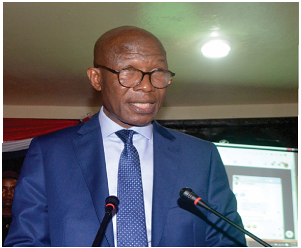The plenary of the House of Representatives, during the passage of the 2023 draft National Budget at US$794,532,681.83 million warned that proper collection of projected revenues can only be realized depending upon rigorous fiscal measures.
On Tuesday, February 21, 2023, the 2023 national envelope was ratified by members of the House of Representatives with an increment of US$16,592,681.83 to the version submitted by the Executive Branch of government.
It can be recalled that the draft revenue envelope was first submitted by the Ministry of Finance and Development Planning (MFDP) on behalf of President George M. Weah at US$777,940,000 for the calendar year January 1 to December 31, 2023.
However, 37 lawmakers voted for the passage of the budget, with Reps. Rustonlyn Suacoco Dennis and Yekeh Kolubah abstaining from the process on grounds that the budget was not properly scrutinized in line with Section 36 of the PFM Law as well as the committee’s failure to distribute copies to each lawmaker for perusal before passage.
Section 36 of the PFM Law, among other things, states that, “It is a general responsibility under this Act for all government officials handling public financial transactions to ensure that financial information is reported in a timely, comprehensive, and accurate manner, in the manner prescribed in this Act, under its regulations, and in instructions issued by the Minister.”
Furthermore, the caveat as inserted in the 2023 budget contained in report by that body committee on Ways, Means and Finance aim to correct pointed-out flaws in past budgets; followed by several recommendations to promote fiscal discipline.
Howbeit, the House’s plenary then agreed to the recommendations that the Liberia Revenue Authority (LRA) ensure the timely collection of all taxes, including SOE’s contribution and arrears from the road funds, on a monthly basis, and that maritime remittance payments be consistent with the LISCR agreement.
Provided that all contributions shall be remitted at most on a quarterly basis, the Bureau of State Enterprises (BSE) shall ensure that the financial reporting of all SOEs is presented fairly, taking into account the expenditures and revenues. The effective monitoring of SOEs shall be conducted on a monthly basis by BSE at the expense of the SOEs, at a cost of 0.025% of their gross income per year.
The LRA and the Ministry of Mines and Energy shall coordinate to ensure the efficiency of collections of mining related taxes, including mechanisms for withholding at source. The LRA shall have viewing rights of all internal revenue generating accounts of revenue generating entities, including all SOEs, and the budget appropriation of the LRA shall be paid immediately upon collection of revenue at the budgetary ratio of 5% of revenue collection until the budgetary ceiling is realized in accordance with the Act creating the Liberia Revenue Authority (LRA).
Other financial measures include all Social Development Funds, including the Land Rental Fees, shall be transferred directly to the affected counties’ escrow accounts; there shall be a revenue sharing of 50%-50% between the Central Government and the Counties (Cities, Townships, Burroughs) for all excess budgetary revenue collected from the Real Property Tax; and the Ministry of Labour shall retain 5% of revenue generating for the enhancement of digital tracking and service systems to cover the cost of providing those services in real time so as to enhance efficiency in their services, among others.
During the House’s Ways, Means, and Finance Committee’s rigorous budget debates, Ministries and Agencies were given the opportunity to defend their draft proposals, but during the public hearing, in cases where there were doubts and insufficient information, the Committee divided into sub-committees to ensure that the hearing intently looked at the programs in detail, so as to ensure value for money.
“Honourable Speaker, Deputy Speaker, and distinguished colleagues, in order to enhance revenue mobilization and ensure efficiency in our service sectors, the Committee recommends the passage of the Fiscal Year 2023 National Budget along with its Budget Working Papers, and the Fiscal Measures stated herein, in addition to the Budget Framework,” the Committee report added.
Meanwhile, of the amount of US$794,532,682, the largest chunk- US$295,620,939 goes to compensation of employees at US$118,656,601.83, subsidy: US$4,946,554; grants: US$95,984,314, Social Benefits: US$16,524,851, Non-financial assets: US$176,226,409; Domestic Liabilities: US$30,112,551 and Foreign Liabilities: US$56,460,362.
While the major revenue sources of the 2023 Draft National Budget are taxes on income and profits US$242,075,000; taxes on international trades, which amount to US$235,964,000; and external resources of US$110 million.
Prev Post

